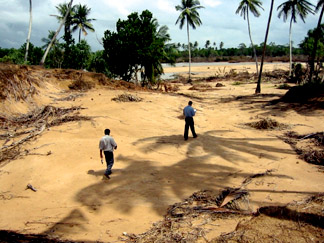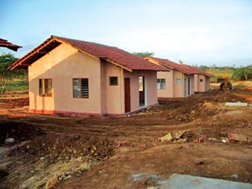|
observer |
|
|
|
|
|
OTHER LINKS |

|

|

|
Americans think Sri Lankan reaction to tragedy is to enjoy life more than ever!For The InquirerHAMBANTOTA, Sri Lanka - Arriving in Sri Lanka for a 10-week internship, I found it hard to believe this island nation halfway around the world had been ravaged by a tsunami 16 months earlier.
Still, there are children who lost at least one relative in the tsunami that killed more than 40,000 and displaced 2.5 million, and I was going to work for two agencies that help these young victims. That terrified me. I imagined an unbearable emotional burden, and a school filled with misery. Instead, these children astounded me. They were uniformly happy, always smiling and enthusiastically applying themselves to their studies. They smiled at everything. My host, Thushari, who lost her husband in the tsunami, explained that Sri Lankans like to smile and laugh. They believe in celebrating life in addition to mourning the dead; their reaction to tragedy is to enjoy life more than ever. I definitely enjoyed my summer on this island off the southern tip of India, working as a computer-technology consultant, touring the country (it's about the size of West Virginia), and spending time with the children. Cultural differencesMy internship, arranged through Carnegie Mellon University in Pittsburgh, was not a typical study-abroad program. Instead of taking classes, I helped design Web sites and brochures for the relief agencies and even taught the children a few gymnastic and dance moves. Although I didn't earn any academic credits, I learned a lot about myself and how the cultures of my homeland and Sri Lanka differ. For example, Sri Lankans have a relationship with time that is completely alien to me. They're very relaxed about pretty much everything. I think it stems from the fact that they are extremely interdependent. In the States, it doesn't matter how big an obstacle you face or what hour of the day it is - where there's a will (and a credit card), there's a way.
It took me weeks to get used to this. I am spoiled at home, with a constant Internet connection, able to find the answer to any question instantly. In Sri Lanka, for the first time since high school, I was limited to the knowledge in my immediate possession. Suddenly, the pressure was off. I didn't have the resources to achieve the productivity required in college, but no one expected me to. After about a month, I was the least stressed than I have ever been. I was relaxed and calm, confident that my work would get done. And time wasn't so important anymore. When it took me and some friends an hour to reach a hot spring, and then we stayed for only 20 minutes, no one seemed to mind. Nobody thought this was a waste of time or a morning ill-spent. I thought they'd all gone mad. And then I got really envious, because they've got the time to travel two hours for 20 minutes of amusement. Life is just that relaxed there. On the other hand, certain things just are not done, such as a single woman riding a bus. It was impossible for me to blend in and go unnoticed, since the population is fairly homogeneous - every native is dark-skinned. But taking the bus was often the best or only way I had to get around, so I ignored the stares and went wherever I wanted. Luckily for me, Sri Lankans like to practice their English when they have the chance, so I got to meet all kinds of interesting and really nice people on buses, such as Chaminda. Interesting peopleChaminda, who spoke fluent Sinhala, English, French and German, grabbed the empty seat next to me and struck up a conversation. During the ride, which took several hours, Chaminda revealed that he used to be a Buddhist monk. Monks in Sri Lanka are accorded a fairly high status. They are allowed only eight possessions, and they must rely on the kindness of strangers for food and money. On buses, they get seating preference, and often there are seats marked specifically for them. Monks are not really supposed to interact with women. That didn't stop Chaminda, who lives near Uda Walawe, a famous elephant park, from inviting me to see it with him. I didn't, though; I had another bus to catch. happy to find that Sri Lankans don't make eye contact when they speak. Instead, they look at each other's mouths. I like this system. I hate eye contact, but I can deal with mouths. The temperature doesn't really change - it is always in the mid-80s. But the humidity varies, and it makes a huge difference. That's why it was so frustrating that, on a sweltering day, there were few places to get cold drinks. Most of the time, the bottles were at room temperature. No one seemed to own ice trays, either. I don't know why. Maybe they just don't like cold things. It was a pity. I craved a Thai iced tea for weeks, but even if I could have found the tea (and tea is a big thing in this country, formerly known as Ceylon), I didn't know how to get any ice. I also didn't get any Indian food until my last week there, even though India is only 18 miles away. But there are lots of Chinese takeout restaurants; even the smallest villages have at least one. They all have signs that look like Italian flags (red, white and green) and are run by Sri Lankans. I didn't see any other ethnic food places, and I didn't see any Chinese people. Their version of fried rice is probably as authentically Chinese as American versions I've had, but I like ours better. As for Sri Lankan cooking, it took me a few weeks to develop a taste for it. The spices are subtle, so everything tasted the same at first. Most protein in the Sri Lankan diet comes from fish, so I tried really hard to like it, but I just couldn't. There were other things about Sri Lanka that took getting used to. For example, stores in Sri Lanka are much more devoted to customer service than those in the States. The customer walks in and immediately sits at a service counter. The employee records everything the customer wants, then gets it. This makes it harder to browse around the store, so I couldn't decide whether I liked it more or less than our style of having to ask for service. Not many swimmersI also found it odd that there weren't many swimmers in Hambantota, where the ocean was rough and the sand was coarse. (Remember, we're talking about a small island surrounded by water.) I was told that the people don't know how to swim - they just wade and get their ankles wet. I wanted to spend some time on the beach behind the house I was staying in, so I could watch the sun rise over the ocean. To get there, though, I had to walk through about 50 feet of pine barrens, and my host said it was too dangerous for someone alone. So much for that romantic image. The hot springs also were a bit disappointing. Instead of sitting in them, you get a bucket and pour the water over yourself. But they were beautiful. So was the drive there through the countryside, where we saw peacocks, cows, buffalo and the tree houses. The tree houses weren't what you'd think. Here's how it works. Farmers have crops - lots of them, green, leafy things. One might even say elephant food. The elephants certainly see it that way. There's no barrier a farmer can affordably build to stop the elephants, so they build small huts in the trees that dot their fields. They sleep in the trees, and, when the elephants come, the farmers try to scare them away. From a career standpoint, the internship was a success because it helped me determine that I liked consulting work but probably would prefer to go into project management. Living there was interesting and eye-opening, in spite of the ant bites, lice, food poisoning, frogs in the shower, and fickle electricity. |
 Yes, graves lined the south coast road on my six-hour ride to
Hambantota for my first assignment. And there was a smattering of new
housing developments built for tsunami victims. But most of the wreckage
had been cleaned up, the shock of the disaster had worn off, and most of
the recovery efforts were well underway if not complete.
Yes, graves lined the south coast road on my six-hour ride to
Hambantota for my first assignment. And there was a smattering of new
housing developments built for tsunami victims. But most of the wreckage
had been cleaned up, the shock of the disaster had worn off, and most of
the recovery efforts were well underway if not complete.  In Sri Lanka, that infrastructure of convenience that I'm so familiar
with just isn't there. It doesn't matter how loudly you yell, or for how
long, or how much you offer to pay, there are things that just can't be
done. The power regularly went off at work for hours at a time, and
occasionally I would wake up to find out that there was no running water
in the house. There was nothing I could do.
In Sri Lanka, that infrastructure of convenience that I'm so familiar
with just isn't there. It doesn't matter how loudly you yell, or for how
long, or how much you offer to pay, there are things that just can't be
done. The power regularly went off at work for hours at a time, and
occasionally I would wake up to find out that there was no running water
in the house. There was nothing I could do. 






